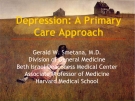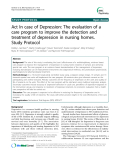Depression: A Primary Care Approach
Gerald W. Smetana, M.D. Division of General Medicine Beth Israel Deaconess Medical Center Associate Professor of Medicine Harvard Medical School
Key Questions
• Does screening for depression work? • How long to treat? • Are newer
antidepressants more effective than SSRIs?
• How do side effect
profiles differ between drugs?
• Which is better:
switching or augmenting?
Epidemiology of Depression
• Twice as common in women as in men • 2-3 fold increase in risk if family history
in parent or sibling
• 2-5% incidence of suicide among
depressed patients
• 3-fold increase in number of sick days
from work
• Leading cause of disability among people
aged 18-44 years
CMAJ 2002;167:1253
Question #1
• Does screening for depression work? • How do I follow up on a positive
screening survey?
Does Screening for Depression Work?
• US Preventive Health Services Task Force • December 2009 Update • Recommends screening for depression (Grade B
recommendation - fair evidence) when resources for Rx and follow up are available • Good evidence that screening improves the
accurate identification of depression in primary care settings and
• Treatment in the primary care setting
Ann Intern Med 2009;151:784
decreases clinical morbidity
Screen for Depression If
anxiety
• Sadness, low energy, apathy, irritability or
unexpectedly frequent use of medical services • Frequent symptoms with unrevealing workups • Concurrent general medical illness • Recent stressful life events and lack of social
• Sexual complaints • Unexplained physical symptoms or
supports
Which Screening Tools to Use?
– 3.3 (range 2.3-12.2)
• Multiple available questionnaires • Administration times range from 1-5 minutes • In a systematic review of screening tools: • Positive likelihood ratio (LR+)
– 0.19 (range 0.14-0.35)
• Negative likelihood ratio (LR-)
• High sensitivity (80-90%) but only fair specificity
(57-85%)
The Rational Clinical Examination. Is this patient clinically depressed? JAMA 2002;287:1160
Simple Screening Tool: Ask Two Questions
1.
2.
•
•
96% sensitive but only 57% specific for at least one positive response Recommended by USPSTF
‘During the past month, have you often been bothered by feeling down, depressed or hopeless?’ ‘During the past month, have you often been bothered by having little interest or pleasure in doing things?’
J Gen Intern Med 1997;12:439
Phan Vietnamese Psychiatric Scale
• Culturally sensitive mental health
questionnaire derived from Vietnamese individuals • Four domains
9
Tuong Phan et al. Transcultural Psych 2004;41:200
– Depression - affective – Depression - psycho-vegetative – Anxiety – Somatic symptoms
Phan Scale: Sample Questions
Affective • Did you feel lonely or empty? • Did you become pale or have dark rings under your
eyes?
• Did you feel your life had become meaningless? • Did you feel disgraceful or ashamed of yourself without
any reason? Psycho-vegetative • Did you feel confused or in a daze? • Did you cry without any reason? • Did you feel like not getting out of bed?
10
Prevalence of Symptoms Among 2000 Adult Vietnamese Refugees to U.S. West J Med 1995;163:341
Prevalence (%)
Symptom
Physical symptoms
Headaches
21
Anxiety about symptoms
25
Loss of appetite
20
Psychological symptoms
Sad
31
Difficulty concentrating
30
Hopeless
7
Culture-specific symptoms
Bothered
10
Shameful and dishonored
7
11
Desperate
6
Suicide Screening Questions
• Three simple questions
– Do you ever think of hurting yourself or
taking your own life?
• Do not fear that asking questions will
suggest the idea of suicide to a patient • Emergency mental health evaluation if
patient can’t contract for safety
– Do you currently have a plan? – What is your plan?
N Engl J Med 2000;343:1942
Ms. Tran
• Ms. Tran is a 24 year old woman who
sees you for sadness
• It has been present for 2 months • She is sleeping poorly and has lost 5 kg.
in weight
• She is distracted and has a hard time
concentrating while at work
• You are contemplating antidepressant
mediations
Question #2
• What are response rates to initial Rx? • How long should one continue antidepressant medication?
STAR*D Trial of Citalopram: Time to Response Among Responders
• Mean dose 40 mg
qd
• Results at 14
weeks • Response – 47% • Remission – 28%
• Most responders do so by 8 weeks
• Consistent with previous reports
Am J Psychiatri 2006;163:28
Systematic Review: SSRIs More Alike than Different
Ann Intern Med 2008;149:734-750
Three Treatment Phases
• Acute Treatment
6-12 Weeks
• Continuation Treatment
• Prevents relapse
3-12 Months
Long term
• Maintenance Treatment • Prevents Recurrence
Approach to Relapse After Initial Rx
• Initial Rx may have been too brief
– Continuation Rx for at least 6-9 months • Relapse after adequate duration of Rx
• First strategy is to resume the same med
that led to initial remission
• Consider psychotherapy in addition to
meds
– Suggests need for maintenance Rx – At least 2-3 years
Special Considerations in the Elderly
• Depression increases risk of mortality post MI, post stroke, and after nursing home admit
• Higher rates of completed suicides • SSRI’s preferred 1st line due to favorable side
effect profile
• SNRI’s second line • Observational data suggest increased
Coupland C, et al. BMJ 2011 epub ahead of print
morbidity and mortality with drug therapy*
Important Considerations
• Initial med Rx response rates 50% • Rx for at least 6-9 months • Withdrawal symptoms if abrupt d/c of SSRIs • Risk of serotonin syndrome for SSRIs increases
with certain drug interactions
• Increased suicidal behavior for SSRIs for
patients aged 18-29 years
• Increased risk of GI bleeding for SSRIs in older
patients
• Medication probably not beneficial for minor
depression
Mr. Le
• Mr. Le is a long standing patient of yours • He is 52 years old and has had a history of
depression decades ago that required treatment
• He sees you for sadness and meets criteria
for major depression
medication
• He would like to begin antidepressant
• He has done some online research and wants to try a newer, more expensive antidepressant
Question #3
• In patients with major
depression, are the newer antidepressants (venlafaxine, nefazodone, mirtazapine, bupropion) more effective than SSRIs?
NO!
Systematic Review: Modest Differences in Response Rates Between New and Old Rx
New Drug
Compared to
OR for Response
Paroxetine
1.35
Venlafaxine
Fluoxetine
1.30
Mirtazapine Fluoxetine 1.39
Paroxetine 1.27
Bupropion Fluoxetine 0.82
Lancet 2009;373:746
Paroxetine 0.73
Comparative Efficacy of SSRIs vs. SSNRIs: No Statistically Significant Differences
Duloxetine
Mirtazapine
Venlafaxine
Favors New
Favors Old
Ann Intern Med 2008;149:734-750
Acceptability: Marginally Favors Two Old Agents: Sertraline and Escitalopram
Drug
Acceptability compared to fluoxetine
1.14 1.19
All comparisons p > 0.05
Old Sertraline Escitalopram New Bupropion Venlafaxine Mirtazapine 1.12 0.94 0.97
Question #4
• How do side effect
profiles differ between drugs?
SSRI Side Effects
Side effects • Nausea (10%) • Headaches (10%) • Sweatiness (10%) • Insomnia (15%) • Sexual side effects
(up to 50%) – Can minimize with
bupropion augmentation • Drug interactions
Available SSRIs • Fluoxetine • Sertraline • Paroxetine • Fluvoxamine • Citalopram • Escitalopram
Citalopram: 2011 FDA Advisory on Dose and Risk of Arrhythmia
• Risk of QT
• Use with caution if
prolongation and torsades at higher doses
CHF, h/o bradyarrhythmia or potential for hypokalemia • Do not exceed 40 mg
interactions
• No more than 20 mg daily for elderly or if liver disease
FDA Advisory August 24, 2011
daily • Expanded list of drug
Tricyclic Antidepressants (TCAs)
• Equally effective as SSRIs • Risk of death in overdose • Side effects are anticholinergic, fatigue,
orthostasis
• Start low: 25 mg at bedtime • Nortriptyline twice as potent as others • Consider use if insomnia or chronic pain
are major features of depression
Specific Drug Side Effects Vary Between Old and New Drugs
Anti- cholinergic
Fatigue Insomnia GI Wt Gain
TCA
++++ +
++++ +
++++ +
Amitriptyline Nortriptyline SSRIs
+ ++
+++ +++
Citalopram Sertraline Other
++ +
+ +++
Bupropion Venlafaxine Mirtazapine
++ ++
++ +++
++
Effect on Body Weight is An Important Consideration Weight Gain Neutral
Weight Loss
Mirtazapine
Citalopram
Fluoxetine
Duloxetine
Bupropion
Amitriptyline
Escitalopram
Doxepin
Sertraline
Trazodone
Venlafaxine
Sexual Side Effects Vary
Drug
Incidence Sexual Dysfunction
< 10%
Bupropion
Mirtazapine
10-30%
Citalopram
Duloxetine
Venlafaxine
> 30%
Fluoxetine
Paroxetine
Sertraline
J Affect Disorders 2009;117:S6
Other Factors Influencing Rx Choice
Factor
Medication Choice
Family h/o response
Select same agent
Geriatric patient
SSRI
SSRI
Obsessive compulsive features
Agitated depression
Sedating antidepressant
Psychomotor retardation
Nonsedating SSRI or NRI
Chronic pain
Duloxetine, venlafaxine
Postural hypotension
SSNRI
Sexual dysfunction
Avoid SSRI
N Engl J Med 2005;353:1819
Prescribing Tips
• Mirtazapine
• Venlafaxine
– Side effect profile similar to SSRIs
– More fatigue – Higher morbidity in
– Very sedating – Useful if insomnia – Constipation – Weight gain
OD than SSRIs
– Case reports of liver
failure
• Nefazodone
– Do not recommend for use in primary care
loss
• Bupropion – Activating – Can cause insomnia – Least sexual effects – May promote weight
Question #5
• What is the approach to SSRI non-responders?
• Switch to another
• Switch classes? • Augment with another
medication in the same class?
agent?
Before Modifying Drug Regimen:
• Inquire about side effects (particularly
sexual) that prevent adherence • Consider adding psychotherapy to
medication
• Consider alcohol or drug abuse (dual
diagnosis)
• Reconsider correct diagnosis of
depression, exclude bipolar or PTSD
Treatment Failures: Switch or Augment?
If no response to first SSRI, choices include: Change to another SSRI Switch to new class Augment by adding second drug
STAR*D: Citalopram Treatment Failures: No Difference Between Switch to Bupropion, Sertraline, or Venlafaxine
Mean Remission Rates: 25%
N Engl J Med 2006;354:1231
Time to Remission for Augmentation: Medication More Effective and Rapid
STAR*D Augmentation: No Difference Between Bupropion and Buspirone
N Engl J Med 2006;354:1243
What is the Role of Adjunctive Antipsychotic Medications?
• Addition of atypical antipsychotics increases
response rates
– Generic risperidone $ 150 per month – Aripiprazole $550 per month – Quetiapine $450 per month
• Suggest using only with psychiatric consultation
Medical Letter Sept. 19, 2011
• Increases response rates by ~ 15% • Best data for aripiprazole and quetiapine • Expensive
Reasons to Seek Psychiatric Consultation
• Failure to respond to trial of two different
medications
• Patient actively suicidal • Suggestion of bipolar disorder • Presence of psychotic features • Patient preference • Co-morbid medical, psychiatric, or substance
use disorder
• Treatment resistant depression with
psychomotor retardation that may warrant ECT
Summary
• Screen with simple two question tool • Exclude suicidality • Acute, continuation, and maintenance
medication
• SSRIs: 50% response, 30% remission • Response rates similar for all SSRIs • Risk of relapse if Rx < 6-9 months • No difference in remission rates for
newer agents when compared to SSRIs
Summary
• Use SSRIs as first choice for most
patients
• Side effect profiles important in drug
choice – Weight loss or gain – Sedation – Sexual side effects
• Switch or augment probably comparable • Meds work more quickly than cognitive
Rx
"If you look into your own heart, and you find nothing wrong there, what is there to worry about? What is there to fear?“
Confucius (551 – 479 BC)
46


















